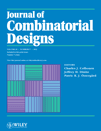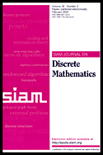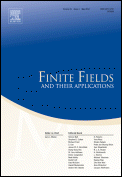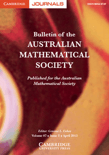
JOURNAL OF COMBINATORIAL DESIGNS
metrics 2024
Advancing the Frontiers of Combinatorial Knowledge
Introduction
JOURNAL OF COMBINATORIAL DESIGNS, published by Wiley, is a leading peer-reviewed journal that serves as a vital platform for researchers in the field of discrete mathematics and combinatorics. With an impressive Q1 ranking in the 2023 category, it stands at the forefront of academic discourse, showcasing significant developments and innovative research from 1993 to 2024. The journal is dedicated to the study of combinatorial designs, including their applications in various scientific disciplines, which enhances its relevance among mathematicians and applied scientists alike. Although it operates on a traditional subscription model, the journal continues to attract high-quality submissions, as evidenced by its Scopus rank of #40 out of 92 in Discrete Mathematics and Combinatorics, placing it in the 57th percentile. Its commitment to advancing knowledge in combinatorial theory and applications makes it an essential resource for professionals, researchers, and students seeking to deepen their understanding and contribute to this dynamic field.
Metrics 2024
 0.75
0.75 0.50
0.50 0.60
0.60 36
36Metrics History
Rank 2024
Scopus
IF (Web Of Science)
JCI (Web Of Science)
Quartile History
Similar Journals

Journal of Combinatorics
Innovating Solutions in Graphs and DesignsJournal of Combinatorics is a premier academic journal dedicated to advancing the field of combinatorial theory and its applications. Published by INT PRESS BOSTON, INC, it aims to provide a robust platform for researchers, professionals, and students to disseminate their findings and engage with cutting-edge developments in combinatorics. With a focus on high-quality, peer-reviewed articles, the journal fosters rigorous mathematical discussions surrounding various facets of combinatorial structures, graph theory, design theory, and combinatorial optimization. Although currently not available as an Open Access journal, the Journal of Combinatorics plays a vital role in enriching the mathematical sciences and serves as an essential resource for academics seeking to stay updated with the latest trends in combinatorial research. By maintaining a commitment to excellence and innovation, this journal is indispensable for anyone looking to deepen their understanding in this critical area of study.

Contributions to Discrete Mathematics
Unveiling new dimensions in combinatorial studies.Contributions to Discrete Mathematics, published by the Department of Mathematics and Statistics at the University of Calgary, serves as a vital platform for disseminating innovative research within the dynamic field of discrete mathematics and combinatorics. Established in 2008, this journal has rapidly gained recognition, currently holding a Q3 classification in discrete mathematics and combinatorics for 2023. As it aims to foster academic dialogue and share groundbreaking discoveries, the journal showcases high-quality peer-reviewed articles that cover a range of topics, from theoretical explorations to practical applications. Although it currently operates under a traditional subscription model, there is a growing commitment to enhancing access options, ensuring that critical knowledge is available to researchers and practitioners alike. With its notable Scopus ranking of #50 out of 92 within its category, this journal is positioned as an important resource for students, academics, and industry professionals who seek to stay at the forefront of discrete mathematics research.

SIAM JOURNAL ON DISCRETE MATHEMATICS
Exploring the depths of combinatorial brilliance.SIAM Journal on Discrete Mathematics is a premier academic journal dedicated to the publication of high-quality research in the field of discrete mathematics. Published by SIAM Publications, this journal features original research articles covering a broad range of topics, including combinatorial optimization, graph theory, and algorithm design. With an impressive impact factor placing it in the top quartile (Q1) of mathematics journals, it is a valuable resource for researchers and practitioners looking to stay abreast of the latest advancements in discrete mathematics. Although currently not open access, the journal commits to disseminating rigorous and impactful findings that advance the understanding of mathematical concepts and their applications in various scientific domains. Renowned for its rigorous peer-review process, the SIAM Journal on Discrete Mathematics serves as an essential platform for scholars aiming to contribute to this evolving field, making it a must-read for anyone involved in mathematical research.

FINITE FIELDS AND THEIR APPLICATIONS
Transforming Mathematical Insights into Real-World Solutions.FINITE FIELDS AND THEIR APPLICATIONS is a premier academic journal published by Academic Press Inc. Elsevier Science that focuses on the interdisciplinary study of finite fields and their diverse applications across various domains of mathematics and engineering. With an ISSN of 1071-5797 and an E-ISSN of 1090-2465, this journal has established itself as a leading platform for researchers, professionals, and students aiming to explore advancements in Algebra and Number Theory, Applied Mathematics, and Engineering. Awarded a Q1 ranking in multiple categories by Scopus in 2023, this journal features rigorous peer-reviewed articles that contribute to both theoretical developments and practical applications, reflecting its relevance within the mathematical sciences community. The journal's convergence over the years from 1995 to 2024 highlights its sustained commitment to quality research, making it an invaluable resource for those seeking to deepen their understanding of finite fields and their significance in contemporary mathematical discourse.

ELECTRONIC JOURNAL OF COMBINATORICS
Unlocking the Potential of Mathematical CollaborationELECTRONIC JOURNAL OF COMBINATORICS, an esteemed publication in the field of combinatorial mathematics, has been a significant platform for innovative research since its inception in 1996. Published by the ELECTRONIC JOURNAL OF COMBINATORICS, this open-access journal has made its complete repository freely available since 2014, encouraging broad international collaboration and dissemination of knowledge. The journal maintains a robust reputation, boasting various category quartiles including Q1 rankings in Applied Mathematics and Discrete Mathematics, highlighting its importance in advancing research and applications in these critical fields. With a clear commitment to showcasing high-impact work and contributing to the ongoing discourse in computational theories, the journal appeals to researchers, professionals, and students alike. Scholars can access a wide array of rigorous articles that explore the latest trends and developments in combinatorial techniques, geometry, and topology, making this journal an essential resource for anyone vested in mathematical sciences. For more information, please refer to their office based at the University of Delaware, Department of Mathematical Sciences.

Journal of Combinatorial Algebra
Unveiling the Complexities of Algebra and CombinatoricsThe Journal of Combinatorial Algebra, published by the European Mathematical Society (EMS), is a pioneering open-access journal dedicated to advancing research in the fields of Algebra and Number Theory, as well as Discrete Mathematics and Combinatorics. Since its inception in 2018, the journal has been committed to promoting high-quality, rigorous research, evidenced by its 2023 scopus rankings placing it in the second quartile across both disciplines. It serves as a vital platform for academics, researchers, and students to share innovative findings, methodologies, and theoretical advancements within combinatorial algebra, facilitating collaboration and knowledge dissemination in the mathematical community. With its open access policy adopted in 2021, the journal ensures that its content is freely available to a global audience, further enriching the landscape of mathematical research. The journal's editorial board, composed of leading experts, guarantees the integrity and academic excellence of published articles, making it an essential resource for those engaged in the dynamic fields of combinatorics and algebra.

BULLETIN OF THE AUSTRALIAN MATHEMATICAL SOCIETY
Elevating Mathematics: A Journal of DistinctionBULLETIN OF THE AUSTRALIAN MATHEMATICAL SOCIETY is an esteemed journal dedicated to advancing the field of mathematics, published by Cambridge University Press. Since its inception in 1969, this periodical has fostered scholarly communication and showcased pivotal research in various domains of mathematics, now projected to continue until 2024. With an impact factor that places it in the Q2 category of miscellaneous mathematics research, it holds a notable position among its peers, ranking 215th out of 399 in the Scopus database. Though it does not currently offer open access options, the journal remains a vital resource for researchers, professionals, and students seeking to deepen their understanding of mathematical advancements. The Bulletin serves as a crucial platform for disseminating original research, comprehensive reviews, and insightful perspectives that navigate the complexities of mathematics today, ensuring the community is well-informed and engaged.

Journal of Integer Sequences
Charting New Territories: The Frontier of Integer Sequence ExplorationJournal of Integer Sequences, published by University of Waterloo, stands as a vital resource within the field of Discrete Mathematics and Combinatorics. This open-access journal, which has been in circulation since 1998, is dedicated to the study and dissemination of research concerning integer sequences, a fundamental aspect in various mathematical disciplines. With a current impact factor reflected by its Q3 ranking in the 2023 category of Discrete Mathematics and Combinatorics, the journal enhances its visibility through a dedicated approach to scholarly excellence and engagement with cutting-edge research. Positioned in Canada, the journal encourages contributions from researchers, professionals, and students alike, fostering a collaborative environment where innovative mathematical ideas can flourish. Explore the depths of integer sequences and their applications by accessing this journal for vital insights and advancements in the field.

Discrete Mathematics Letters
Sharing groundbreaking research in Discrete Mathematics.Discrete Mathematics Letters is a prominent open-access journal dedicated to advancing the field of Discrete Mathematics and Combinatorics, published by Shahin Digital Publisher. Since its inception in 2019, this journal has rapidly established its presence in the academic community, securing a respectable Q2 category ranking in the 2023 Scopus database, positioning itself at rank #45 out of 92 in its field, making it a valuable resource for researchers and practitioners alike. With a commitment to disseminating high-quality research, Discrete Mathematics Letters provides an accessible medium for sharing innovative ideas and findings within the mathematical sciences, ensuring that researchers, students, and professionals stay informed about the latest developments. As an open-access journal, it provides free access to publications, fostering collaboration and knowledge exchange among the global research community.

Problems of Information Transmission
Pioneering Research in Transmission TechnologiesProblems of Information Transmission, an esteemed journal published by PLEIADES PUBLISHING INC, serves as a critical platform for scholarly discourse in the fields of computer networks, communications, computer science applications, and information systems. Established in 1972 and resuming publication from 2005 to 2024, this journal provides a rigorous peer-reviewed environment for researchers to present their findings, methodologies, and innovative applications. With a noteworthy impact factor and categorized as Q3 in several relevant fields in 2023, it ranks within the 30th percentile amongst its peers, indicating its established presence in the academic community. Although the journal is not open access, it remains an essential resource for professionals and students seeking to explore contemporary challenges and advancements in information transmission. For those pursuing knowledge in these dynamic areas, Problems of Information Transmission represents a significant and authoritative source of cutting-edge research and insights.